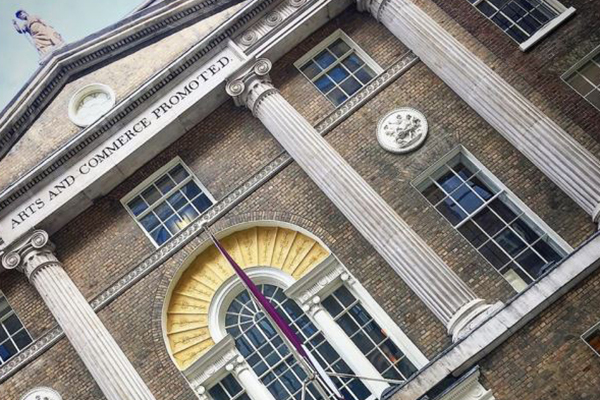Ross Smith offers his thoughts on the modern day re-incarnation of the 18th century flaneur via social media.
Flaneur is a 19th-century term for an aristocratic "man about town" – and the female 'flaneuse" - an aristocrat who saunters idly around the streets of London, Paris or elsewhere – pontificating and generally looking good in their aristocratic high fashion. It is a great job if you can get it.
The Paris Review describes:
The figure of the flaneur—the stroller, the passionate wanderer emblematic of nineteenth-century French literary culture—has always been essentially timeless; he removes himself from the world while he stands astride its heart.
Victorian era London was filled with an essence of the flaneur. Charles Dickens was a great example. In "The Old Curiosity Shop", the narrator is a curious blend between the all-seeing devil and Master Humphrey, the flâneur from the beginning of the tale; Humphrey's vision is partial and he speculates about his characters' future. This curious blend between these two opposed modes of apprehension of the city seems to be encapsulated in a passage from Master Humphrey's Clock, in which he recounts a recent expedition to the top of Saint Paul's:
It is night. Calm and unmoved amidst the scenes that darkness favours, the great heart of London throbs in its Giant breast . . . Draw but a little circle above the clustering housetops, and you shall have within its space everything, with its opposite extreme and contradiction, close beside. Where yonder feeble light is shining, a man is but this moment dead . . . . Does not this Heart of London, that nothing moves, nor stops, nor quickens,—that goes on the same let what will be done, does it not express the City's character well?
In cities and countries with high unemployment and/or low wages, the streets are filled with the unemployed, walking around or loitering, pontificating over their next meal - and generally living a similar, though less-than-aristocratic life of the flâneur. Similarly, thousands of aspiring journalists blog, stream, and post their thoughts online, representing the modern-day digital equivalent of these hifalutin nomads.
In the 1800's, the flaneur was held in high regard in society. They clearly had enough resources to live and stroll about town. Fast forward to the 21st century, the high society flaneur no longer exists. You don't see tech billionaires donning high fashion and strolling the streets of Seattle or Silicon Valley – or the Wall Street tycoons wandering the streets of New York city pondering the future of the world for everyone to observe.
What has changed?
I think part of this is how what we value in our heroes and idols has changed. In the old days, aristocracy and royalty was revered and highly admired. Today, we put more value in the lone wolf tech entrepreneur over family money or royalty. We expect our billionaires to continue to burn the midnight oil despite their riches.
Perhaps the internet has changed things? We don't see Gates or Bezos or Musk strolling the streets of their respective communities, visibly pontificating about the future – but we do read about them on the web – we watch their TED talks – so maybe the new age flaneur is on YouTube – and scaling well beyond their local community. We see the Technorati strutting their stuff on blogs, podcasts, Medium, Reddit, Twitter, LinkedIn, Facebook, Instagram and a host of other social sites. Is this not the digital equivalent of the flaneur?
It is interesting to consider how the future of AI, automation, and worker displacement might influence the 21st century digital flaneur. Workers in dozens of industries will be replaced by machines. Many of the tasks of the typical worker will continued to be digitized and automated. When was the last time you sent a letter to a customer with a printed invoice? This transformation has been underway for many years, but what's different about AI and machine learning advances is the pervasiveness of the tasks that will be replaced. Lawyers, designers, retailers, managers, salespeople, customer service agents – dozens of careers will be disrupted over the next few decades.
As Arnaiv Adhikari describes in the Atlantic:
For as long as there have been cities, there have been wanderers, figures who have slipped away from the constraints of time and responsibility, to drift through urban terrain, seduced by a hidden alleyway or a crowd in the marketplace. The flâneur, as this wanderer came to be known in his more polished nineteenth century incarnation, was a symbol of privilege and leisure, an embodiment of the artist who submits himself to the transient experience of the metropolis. A passionate spectator of the ways in which modernity unfolded across these cityscapes, he became both a recorder and a reflection of a new historical moment. The flâneur was, as Charles Baudelaire wrote, "a kaleidoscope gifted with consciousness ... an 'I' with an insatiable appetite for the 'non-I'.
The question ahead is how workers displaced by AI and perhaps supported by a universal basic income, might adopt this new role of flaneur – or digital flaneur – and provide inspiration to the world around them, strolling the metaphorical cobblestone lanes, in full garb, of Twitter, Reddit and other social media channels, pontificating about the future of society.
As they say, "the more things change, the more they stay the same..." I think it's incumbent upon all of us to reboot the spirit of the flaneur – and to spend time walking around, thinking about the future.
Our time is now.
Ross Smith is the Director of Skype for Good; he has worked at Microsoft for over 27 years and is a Principal Group Engineering Manager.
Related articles
-
What is the RSA?
Anton Howes
The RSA historian-in-residence on over 270 years of work to benefit the public as “the nation’s improvement agency.”
-
Can authenticity prevent chaos?
Barwise
Michael Barwise takes aim at conformism and the illusion of individuality.
-
Values and Wellbeing
Charles Fowler FRSA
Ahead of World Values Day 2019, Charles Fowler FRSA outlines the importance that consideration of our values holds.




Join the discussion
Comments
Please login to post a comment or reply
Don't have an account? Click here to register.
where can the modern philosophers be read... are they harder to spot due to the plethora of democratised, down to earth, practical philosophy self published on social media and on-line publishing houses?
Did the flaneur pontificate on how to live rather than how to think?
Philosophers and institutions (such as church, political party etc) have historically helped the populous to know how to think about things... for good or ill this has worked through eras of simple lives with simple challenges only needing simple morals and simple laws. In an increasing complex and nuanced world there seems to be a big gap emerging .... one might ask that in an increasingly nuanced and complex, personalised world should we consider personalising the rule of law... adapt morals to circumstances of the individual...
AI or rather the Knowledge based or deep learning systems certainly allow more in-depth, consistent, and simply more, considered advice to be given to those making decisions.
Automation replaces tedious, repetitive, dangerous and complex tasks
... but in NEITHER case should this tech replace the skills!
... who will teach the machines if there are no artisans?
... AND .. people like to 'do' with their own hands, their own minds etc. I like wood turning , I can't produce excellent creations but they are MINE and it is my energy and love which goes into the quirky creations that result form my toil... purpose without pressure!
I once heard Bill Gates say 'who would want an acoustic piano when windows produces such a great sound...' , well, ME! I want the physical experience, the all encompassing full body and mind experience. But, knowing I will never be good enough , I wouldn't want to play scales for a living.
'..careers will be disrupted..' so what's new, they always have been, thats not the issue here. there is no progress in any field or situation without disruption. Getting a dog certainly disrupted our lives but we are all the richer for it.
But... when disruption concerns our livelihood , that's a different level of stress altogether.
So, how do we take the worry out of disruption so that people can embrace it?
... how do we replace the purpose lost if a day job disappears ?
Whilst the image of the flaneur is entertaining and possibly instructive, it risks hiding an important truth... there is a lot of talk about getting people to be more creative to fill the gap created by a job disruption... that's NOT what most people want... they want purpose, they want to 'do', they want some agency and at least some illusion of self determination... they won't get that from pontification or endless 'leisure activities'.
So again, the flaneur is a useful thought experiment but not a good model upon which to build the future of purpose in a world when people might be increasingly liberated from mundane or dangerous paid work
Work pays the bills
Purpose enriches our lives.
creating work is an act of generosity and working for someone is a similar reciprocal act.
We need to differentiate and recognise more explicitly 'purpose' and 'paid employment'
For many their purpose evolves... playing music at school, getting a qualification, raising a family, travelling the world. (These are 'minor' purposes perhaps, they are not the meaning of life, but the pursuit of that leads to madness!). For many of course their paid work is one of their key purposes but, significantly, work is how they fund all their purposes.
I believe firmly that most people actually enjoy their jobs but it is strangely unfashionable to admit it!
Recognising this is important because it is a key part of the pain felt when a job is lost.. lost income, lost purpose, lost social engagement, lost enjoyment...
For me then our focus should not the a concern for technology replacing current roles or jobs... tech has always done this and there are more people employed today than ever before... so clearly replacement tech leads to more jobs. Our focus should be how to help people discover and pursue purpose when that offered by their conventional paid day job disappears.
Inspired thought piece, Ross. A delightful read, stimulating and relevant.